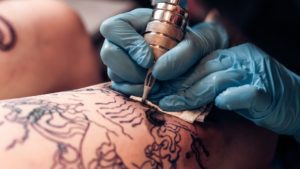Rather than hire a tattoo supervisor, maybe the Minnesota Department of Corrections should consider training prisoners in jobs currently in high demand that welcome reformed felons and could provide higher income potential.

Looking for a new gig? Give ‘prison tattoo supervisor’ a shot
The Minnesota DOC is asking for qualified applicants to take the lead on establishing, maintaining and managing a tattoo/body art studio within its prisons.
Body ink artisans looking for a change in scenery, listen up: The Minnesota Department of Corrections (DOC) is hiring a tattoo supervisor for its pilot tattoo studio program.
The DOC posted the job on April 8, asking for qualified applicants to be the lead resource for establishing, maintaining and managing a tattoo/body art studio within Minnesota’s correctional facilities.
A representative for the DOC told KARE 11 the pilot program is ultimately an effort to offer job training to incarcerated individuals to reduce reoffending, and to address facility health and safety concerns that come with prison tattoos.
“One of the biggest risk factors when people get out of prison is lack of employment,” said Nick Kimball with the MN DOC. “Creating a licensed tattoo training studio in our prisons offers a path to becoming a licensed tattoo technician provides another potential employment opportunity upon release for those who participate, with the goal of reducing recidivism.”
The posting says the tattoo supervisor will create a program in which “incarcerated men and women will be trained and supervised in the art of tattooing.” Kimball says the program will also address requests for tattoo removal.
In regards to safety, Kimball says unsterile materials used during unregulated tattooing among prisoners can often lead to infections like Hepatitis C, prompting the DOC to spend thousands of dollars each year treating patients.
“Nationally, illegal tattooing is a problem in prisons. Incarcerated men and women often use unsterile materials (pins, paperclips, etc.) and techniques, which can create health risks for them and agency staff,” Kimball said. “[The program can help with] reducing the risk of site infection and the associated medical costs caused by unsanitary and unauthorized tattooing.”
Kimball compared the new initiative to a long-standing barber program within its prisons, saying a number of inmates who were licensed as barbers while incarcerated went on to work at barbershops upon their release.
Minimum qualifications for the tattoo supervisor position include at least three years of experience tattooing with a “strong, well-rounded” portfolio. DOC prefers candidates who have worked in a corrections setting, have had experience managing a tattoo studio and First Aid Certification, among other prerequisites.




